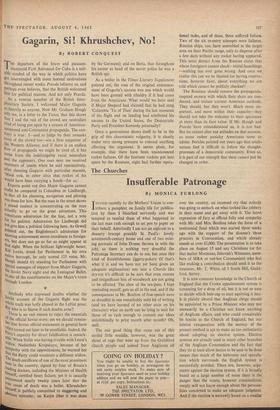Gagarin, Si! Khrushchev, No!
By ROBERT CONQUEST THE departure of the brave and pleasant- mannered First Astronaut for Cuba is a suit- able symbol of the way in which politics have got intermingled with more normal motivations throughout recent weeks. Pravda informs us, and Perhaps even believes, that the British welcomed him for political reasons. And not only Pravda.
As a veteran member of the British Inter- Planetary Society, 1 welcomed Major Gagarin as heartily as anyone. Now Mr. Graham Hough tells me, in a letter to the Times, that this shows that I and the rest of the crowd are neutralists tired of being put upon by a stream of American- sPonsored anti-Communist propaganda. The con- trary is true: 1—and to judge by their remarks most of the crowd too—am a firm supporter of the Western Alliance, and if there is an endless flow of propaganda we might be tired of, it has ctIlue from the indefatigably vocal neutralists and the appeasers. One man near me received Murmurs of assent when he said ruminatively, after cheering Gagarin with particular warmth, Mind you, in other circs that rocket of his Would have been carrying a bomb—for us.'
Experts point out that Major Gagarin cannot really be compared to Columbus or Lindbergh, la that all his planning, navigation and piloting Was done for him. But the man in the street shows a sound instinct in concentrating on the man actually to go on the great adventure. This constitutes admiration for the feat, not a vote for his politics. Admiration for Lindbergh did not give him a political following here. As Orwell Pointed out, the Englishman's admiration for sPorting achievement seems inordinate to foreign- ers, but does not go so far as might appear at first sight. When the brilliant lightweight boxer, 1"id Lewis, stood for Parliament in his own native borough, he only scored 125 votes. Mr. Haugh should try standing for Parliament with special messages of support from Major Gagarin, the Soviet Navy eight and the Leningrad Ballet, to one of the constituencies on the Major's route through London.
Anybody who expressed doubts whether the Soviet account of the Gagarin flight was the \viliole truth was hotly abused in the Leftist press. but who is to blame if such doubts arise?
There is no real reason to reject the essentials ef the official Soviet story; yet we should remem- ber that Soviet official statements in general have often turned out later to be unreliable. Indeed, the party's capacity for direct falsification is remark- a,le. When Stalin was having trouble with Lenin's sWId°w, Nadiezhda Krupskaya, because of her ItymlPathy with the oppositionists, he warned her The the Party could nominate a different widow. Ihe death certificate of one of the most prominent men in the country, signed by four of Russia's doctors, including the Minister of Health himself, certified heart failure, yet it is casually announced nearly twenty years later that the himself cause of death was a bullet. Khrushchev u,rnself is publicly committed to staggering and ol pylons untruths: on Katyn (that it was done by the Germans); and on Beria, that throughout his career as head of the secret police he was a British spy.
As a writer in the Times Literary Supplement pointed out, the tone of the original announce- ment of Gagarin's success was one which would have been greeted with ribaldry if it had come from the Americans. What would we have said if Major Shepard had claimed that he had sung `Columbia 'Tis of Thee' during the last moments of his flight and on landing had attributed his success to the United States, the Democratic Party and President Kennedy personally?
Once a government shows itself to be in the grip of this chauvinistic vulgarity, it is clearly under very strong pressure to conceal anything affecting the argument. It seems plain, for example, that there have been unannounced rocket failures. Of the fourteen rockets put into space by the Russians, eight had further opera- tional tasks, and of these, three suffered failure. Two of the six re-entry attempts were failures. Russian ships, too, have assembled in the target area on their Pacific range, only to disperse after a few days without any rocket having appeared. This must detract from the Russian claim that where foreigners cannot check—initial launchings —nothing has ever gone wrong. And once we realise this can we be blamed for having reserva- tions, however faint, about everything we are told which cannot be publicly checked?
The Russians should remove the propaganda- inspired secrecy with which their shots are con- ducted, and imitate current American methods. They should, but they won't. Much more im- portant, and more within their capacity—they should not take the welcome to their spaceman at more than its face value. If Mr. Hough and Pravda have misunderstood us, it is too bad. But we cannot alter our attitudes on that account, as some rather panicky Americans seem to advise. Pericles pointed out years ago that totali- tarians find it difficult to follow the thought- processes of a democratic community. Even so, it is part of our strength that these cannot just be changed to order.


































 Previous page
Previous page